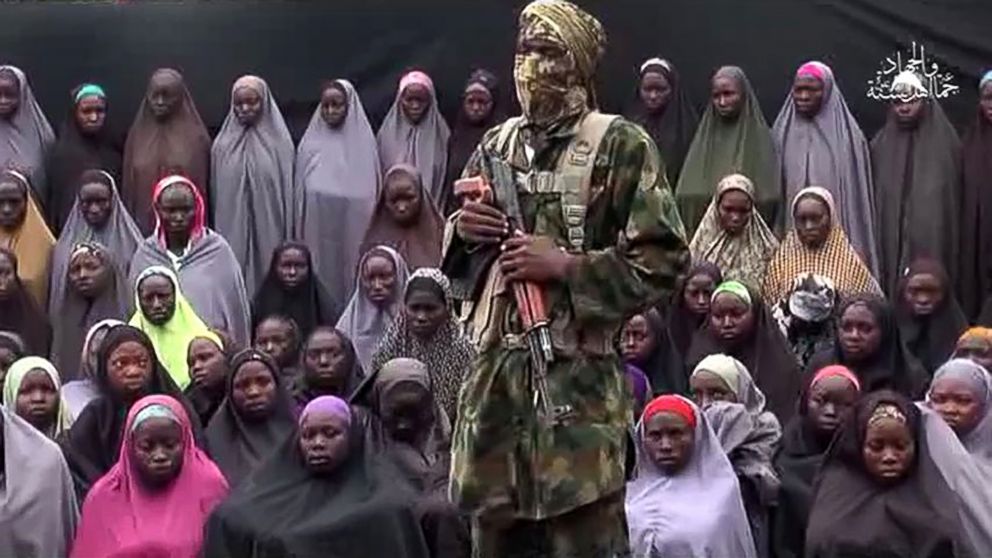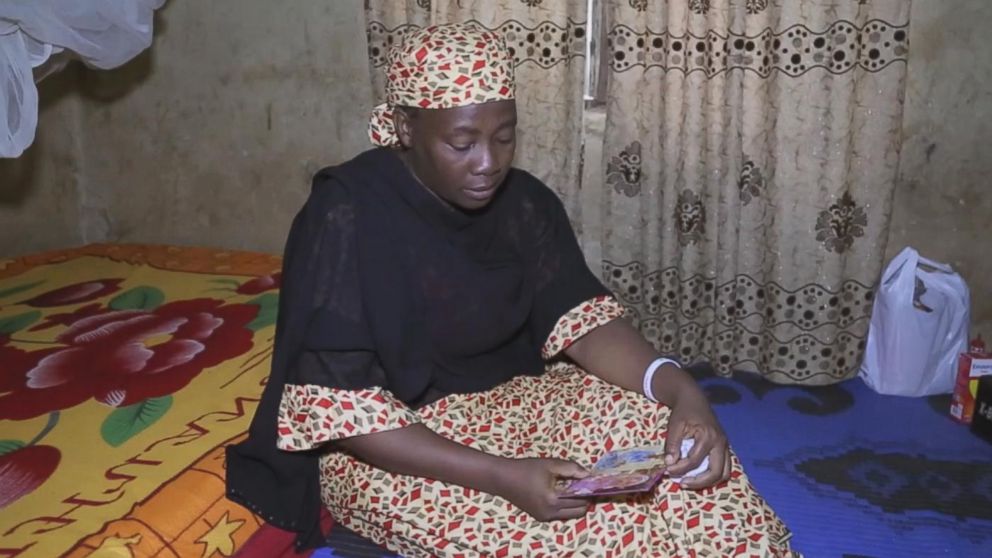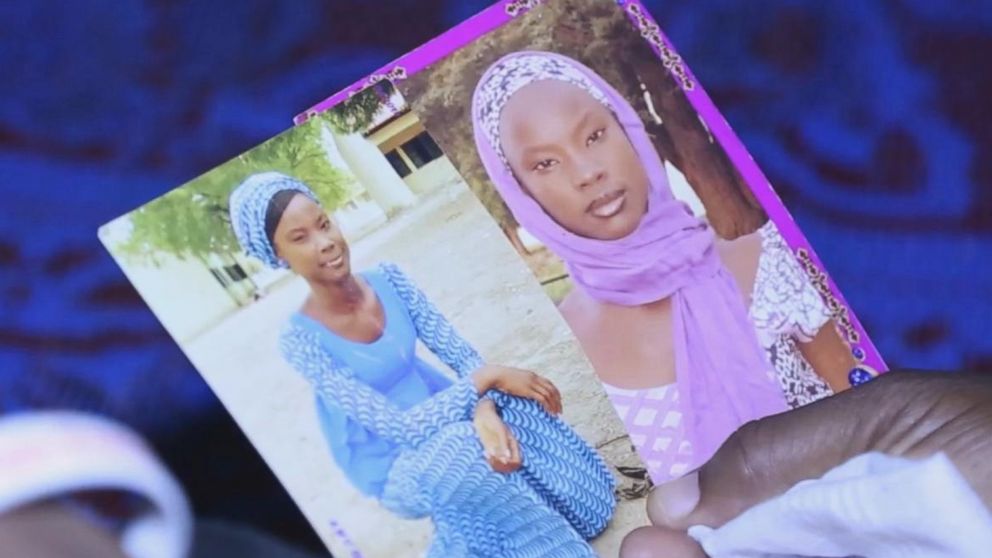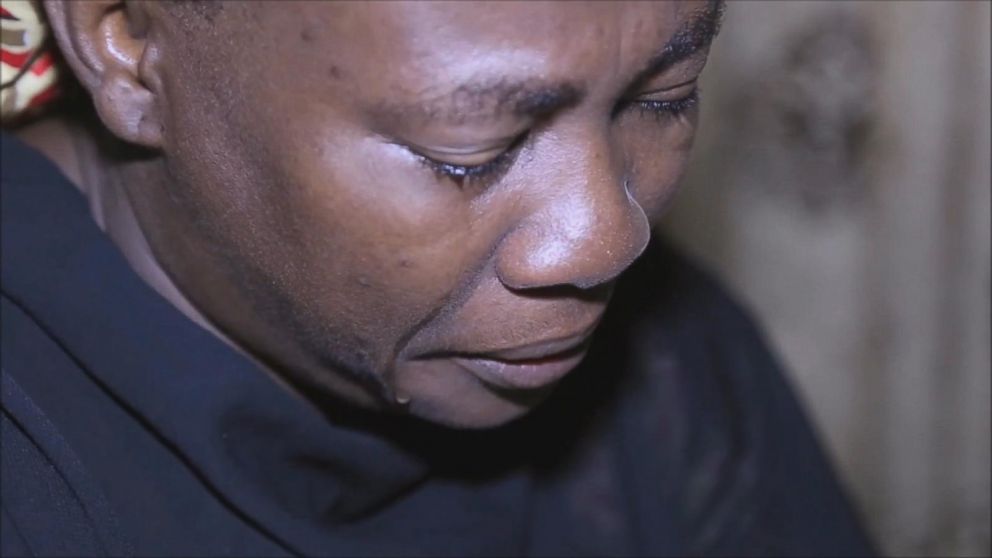Abducted Chibok Girl's Mother Pleads With Nigerian Government in New Video
— -- Esther Yakubu holds two grainy photos of her bright-eyed daughter in her hands and begins to cry.
“Maida, you’re my life,” she says through tears in her native Kibaku language, translated into English. “Maida, I want to see you.”
Yakubu’s daughter was one of over 200 schoolgirls abducted by Nigerian terror group Boko Haram in the northern town of Chibok on April 14, 2014. Maida, who was known by her classmates as Dorcas, was 15 at the time.
Last month, Boko Haram released a new video showing some of the missing girls. Dressed in Islamic garb with a patterned headscarf, Maida was one of them, her parents said.
In the video, a masked militant dressed in camouflage and brandishing a gun says there have been no negotiations with the Nigerian government and that some of the kidnapped Chibok girls have died in airstrikes targeting Boko Haram. He says the remaining girls will be freed if the government releases imprisoned members of the group.
The militant then instructs Maida, now 18, to speak. The brightness in her eyes as seen in photographs has faded, and she speaks carefully as she identifies herself and delivers a scripted appeal for freedom. The video ends showing what appear to be the bodies of several dead girls.

It’s been almost three weeks since Boko Haram released the video, and Yakubu says she has not been contacted by the Nigerian government regarding her captive daughter. The grief-stricken mother and other activists fighting for the Chibok girls’ freedom have tried to deliver a message to President Muhammadu Buhari in recent days but said they have been blocked by police from entering the presidential villa.
So, in a desperate plea to save her daughter, Yakubu recorded a video message to the government, which was released this week by US-Nigeria Law Group and obtained by ABC News.
“This message I have for the federal government is for them to release the fighters so that the fighters will release the girls,” Yakubu says, speaking in English. “For two years, four months [the girls] have been in the hands of terror.”

In a second video, Yakubu is looking at photographs of her daughter and speaks directly to her in their native Kibaku language.
“Whatever these people are doing to you, you should know that the God you worshiped is the one who kept you alive till now,” she says, sobbing. “You should not forget even if you die or you're alive, you will never come out of my heart.”
Emmanuel Ogebe, an international human rights lawyer whose Washington, D.C.-based firm recorded and released the videos, has been working with the Yakubu family and other members of the Chibok community to bring back the missing girls. With no help from the Nigerian government, Ogebe said the Yakubu family has chosen a suitable individual to negotiate on their behalf with Boko Haram for a prisoner swap.
“The family is trying to take proactive steps regardless of the government’s action or inaction,” Ogebe told ABC News. “This process will have to engage the government. But what we’re hoping for is at least we can lay out a road map to that destination and if we can get the government to respond positively toward a prisoner release.”
The Nigerian government did not immediately respond to ABC News’ request for comment.

In May, Nigerian troops and a vigilante group found one of the missing Chibok schoolgirls in the vast Sambisa Forest, a stronghold of Boko Haram. The teenager was identified by the army as Amina Ali. She was found with a 4-month-old baby, who authorities said is her daughter, and a man identified by the army as Mohammed Hayatu, who said he is her husband. Hayutu was detained for questioning as a suspected Boko Haram militant. The three were examined by military medics and deemed stable. Amina was reunited with her mother, the army said.
According to Ogebe, the teen told her family that six of her classmates had died.
“Amina knew of girls who had died. We asked that the government hold a summit for all the parents and share with them classified information that Amina provided. None of this was done,” Ogebe told ABC News. “Then Boko Haram released video of the dead bodies, and the families are seeing and knowing this for the first time. This could have been avoided.”
The Nigerian military’s failure to act on the girls’ kidnapping led in part to President Goodluck Jonathan’s electoral defeat to Buhari in March last year. Since taking office, Buhari has made the war against Boko Haram a top priority, but families of the missing schoolgirls are growing weary.
Buhari has said corruption from previous administrations was largely to blame for the army’s inability to quickly defeat Boko Haram, which aims to oust the federal government and establish an Islamic state in West Africa. In the past year, Buhari has replaced the military top brass and relocated the command center to Maiduguri in Borno state, the heartland of Boko Haram’s seven-year insurgency that encompasses the town of Chibok.
ABC News' James Bwala contributed to this report.




